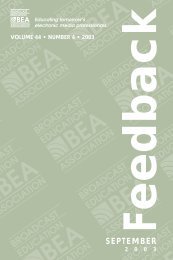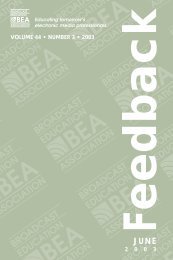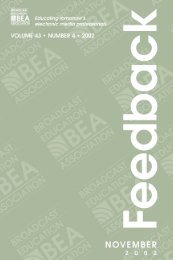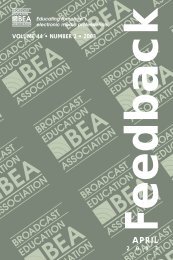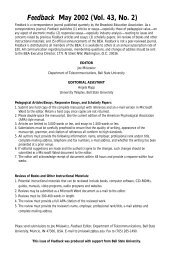DIGITAL STORYTELLING!
Feedback February 2003 (Vol. 44, No. 1) - Broadcast Education ...
Feedback February 2003 (Vol. 44, No. 1) - Broadcast Education ...
Create successful ePaper yourself
Turn your PDF publications into a flip-book with our unique Google optimized e-Paper software.
Will programming become interactive? The common answer is yes, but my opinionis a radical no. There is little doubt that advertising will be eventually successful atgetting sufficient viewers to exercise interactive options, but programming is different.Viewers consume entertainment programs as whole units; they want to experience thestory the storyteller has created, not interrupt it (even if a TiVo takes them back to theplace they left off). The primary exceptions on the programming side are likely to besports, how-to shows, and music programs targeting young people, such as on MTV,CMTV, and similar channels. I think a lot of click-options inside programs, onproducts, cloths, hair styles, cars, and so on will be tried out and found to generatelittle response.ConclusionsOne inescapable facet of television programming is that most viewers, and mostlisteners, continue to be passive most of the time. The fuller one’s life, the morecomplex the world, the more tired one is, and the more one uses computers forprofessional work, the less energy one has left to devote to making choices about howone is going to be entertained. Consuming television is, for most people most of thetime, an activity that must be relaxing and easy, not interactive and challenging. Thoseof us intellectuals who pick the sophisticated entertainment shows to watch—the onesthat demand brain energy (Remember Murder One? How about Monday Court?)—don’t consume a lot of television. We are not the mass audience, a fact that it is so easyto forget. If you and I printed out lists of all the episodes and programs we havewatched in our lifetimes, they might stretch from here to New York, but a heavyviewer’s list might stretch to the moon! College students are also not the massaudience. They are generally at an energetic time in their lives with spare time (or theneed to procrastinate) and few responsibilities; thus, many are especially receptive toinvitations to look here, click there, and jump over here. I foresee a programmingfuture for most people most of the time that looks more like Terry’s “automatedfacilitation of viewer passivity” than it does like the dreams of programs full of instantlyinteractive click-thoughs and pop-ups.ReferencesEastman, S. T. (2000). Research in media promotion. Mahway, NJ: LawrenceErlbaum Assoc.Eastman, S. T. (1998a). Report on compilation valuation for distant television signals.Prepared for Canadian Broadcasters Rights Agency Inc., Canadian RetransmissionRights Association, and Border Broadcasters Collective, Inc., in statement of caseand exhibits retransmission 1998-2000 for Copyright Board, Canada.Eastman, S. T. (1998b). Programming theory under stress: The active industry andthe active audience. Communication Yearbook, 21, 323-377.Ferguson, D. A. (2002). Online video and audio programming. In S. T. Eastman &D. A. Ferguson (Eds.), Broadcast/cable/web programming: Strategies and practices,6th (pp. 322-347). Belmont, CA: Wadsworth Publishing.Ferguson, D. A., & Eastman, S. T. (2002). A framework for programming strategies.In S. T. Eastman & D. A. Ferguson, Broadcast/cable/web programming: Strategiesand practices, 6th (pp. 3-34). Belmont, CA: Wadsworth Publishing.Terry, H. A. (2002, Mar. 23 ). Personal communication. Indiana University,Bloomington, IN.STUDIO TELEVISION AND THEDISCOVERY PROCESST. Robin Riley, University of Cincinnatirobin.riley@uc.eduCLASSROOMMany problem areas arise in any student-produced television. Such programs arecomplex production activities that involve specialized positions, substantial humanresources and planning. If the television studio laboratory activities are to preparestudents to compete in commercial broadcasting, they must effectively integrate a styleof teaching that facilitates personal discovery. Indeed, the student’s discovery thatlearning is directly linked to his performance is central to any productive learningabout television production. In order to achieve this discovery, teachers must shift theemphasis from the classroom to the studio and student’s experience there.Traditionally the classroom has been viewed as the primary locus of instruction.Assumptions that a student’s primary acquisition of knowledge comes from lecture andreading will result in a less meaningful learning experience (Warfied, 1958). Classroominstruction does not prepare students for what they will discover by using equipment ina tactile, hands-on experience. Too little exposure to the technology leaves studentsisolated from the production process and makes the learning experience less meaningful(Dornan, 2000). The primary facilitator of learning in the television production classis the television studio.These claims highlight the importance of experiential learning as a pedagogicalcomponent; they require the development of a coaching method that successfully integratesclassroom instruction and studio experience. The television studio production is,after all, the primary initiator of a valuable learning experience and the students’performance in production duties initiates a discovery that greatly benefits students.Correspondingly, the television studio production process induces a shift in howstudents view the learning process itself. This mental shift in student perceptions aboutlearning involves a discovery of great significance to the teaching activity and is instrumentalin students’ successful transition to the professional world. What occurs in theminds of students when they come to realize that the television production, as a learningactivity, is very different from what occurs in traditional classroom study.What facilitates learning in this production setting? While many answers are possible,the one provided here deemphasizes traditional classroom elements of reason,memory, and logic. That is, the purpose of the television course is to put less emphasison the conceptual or theoretical areas and more on the performance experience(Kucera, 1962). This emphasis on the experience of learning places one directly withinthe studio setting, the primary locus of learning for the basic television productioncourse.84Feedback February 2003 (Vol. 44, No. 1)BEA—Educating tomorrow’s electronic media professionals 85





